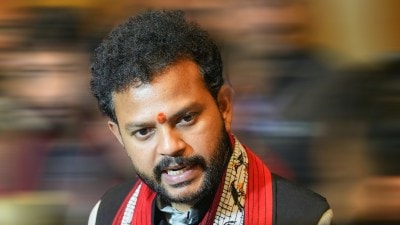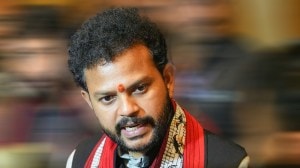Click here to follow Screen Digital on YouTube and stay updated with the latest from the world of cinema.
Abhishek Banerjee’s Stolen is a self-reflective thriller that strips the urban saviour trope down to its vanities
Stolen turns its gaze on the conceit of liberal righteousness: the kind that treats marginalisation not as lived reality but as an aesthetic. It indicts the impulse to convert another’s suffering into one’s own moral reckoning.
 Jhumpa, whose pain launched the story, becomes the terrain over which two men perform their identities.
Jhumpa, whose pain launched the story, becomes the terrain over which two men perform their identities.Exactly midway through Karan Tejpal’s Stolen, in the heat of a car chase, the film begins to look inwards. Raman (Shubham Vardhan), gripped by suspicion, turns to Jhumpa (Mia Maelzer), the tribal woman sitting behind him, and begins to question not only her truth, but his own assumptions. Doubt creeps in. He accuses her of lying, of using him, of twisting his privilege to her ends. It is at this moment that the film shifts gears. The road movie tightens into a chase film. The tone hardens: metal, dust, fury, evoking something like a Mad Max. But above all, something subtler emerges. A sort of self-awareness that wasn’t there before. The film begins to watch itself, to interrogate the hands that made it. Here, the story folds back on the liberal gaze. The one that rushes to save, to empathise, but recoils the moment its moral certainty is threatened. It is here the film stops pretending to be a thriller. It becomes a mirror.
After all, for Raman, Jhumpa was not a person, she was his possibility of being brave. She was his chance to matter. Not because of who she was, but because of what she allowed him to become in his own eyes, a witness, a saviour, a man finally standing for something real. So it’s no accident that, at least for the first forty minutes, Raman carries himself with the quiet pride of a man convinced he is doing the right thing. It’s no accident that he bears the name Raman, echoing Lord Rama, the archetype of moral clarity, the noble protector. And it’s no accident, either, that the film conspires, in those same forty minutes, to cast him in that light. The narrative flatters him. It flatters us, too, drawing us into his delusion that this is his film. That Jhumpa exists solely to redeem him. And not just Raman, but Gautam (Abhishek Banerjee) too, his elder brother, adrift, who, through Jhumpa, will supposedly find his spine, his voice, his manhood.
 The story was always Jhumpa’s, but she was overshadowed by Gautam’s pragmatism and Raman’s idealism.
The story was always Jhumpa’s, but she was overshadowed by Gautam’s pragmatism and Raman’s idealism.
Because just look at how the film begins: an image of Jhumpa asleep on a railway platform, her daughter curled beside her. You think, for a moment, that this will be her story, a story of motherhood, of marginalization, of the fight for survival. And it is all of that, but not before two outsiders, two men, intrude. They barge not just into the railway station but into the narrative itself, quietly stealing it from her. Her child is taken. At first, she suspects that Raman is responsible. But soon, all three of them realise the truth: someone else is behind the disappearance. Gautam, who is just as privileged as Raman, but more “practical” wants nothing to do with it. He simply wants to keep the world’s suffering at arm’s length. Raman, on the other hand, sees in this crisis a moral opportunity. Gautam urges him again and again to not get involved. But Raman is already involved, not just in Jhumpa’s tragedy, but in his own need to be the righteous one. And so, what begins as the story of a mother from a marginalized community is gradually reshaped into a tale of two brothers in moral opposition, the righteous versus the practical, the idealist versus the cynic. The woman whose pain launched the story becomes the terrain over which two men perform their identities.
In fact, as the film goes deeper, Jhumpa’s story becomes the battleground on which men violently stake their claim on what they believe is just. Tejpal seizes this moment to probe the aimless rage that simmers beneath the surface, the sharp edge of intolerance, the thirst for vengeance, the corrosive grip of falsehoods that choke the nation. All of this resonates. It strikes a nerve. But soon, the cracks in the narrative begin to show. You start to sense the design. You begin to realise that, eventually, this is going to become yet another story of the urban saviour. You begin to suspect the story will not return to Jhumpa. You begin to sense the film’s limits, accepting it might resemble a NH10 but will never reach the heights of its more evolved politics.
And here, at the film’s midpoint, the veil lifts. You begin to see that all along, you’ve been caught in Tejpal’s carefully laid trap. The design was the deception. The story, it turns out, was always hers. But was overshadowed by Gautam’s hard pragmatism and Raman’s desperate idealism. She said it more than once that she would find her daughter on her own. But no one listened. We waited for the men to act, to fix, to carry the weight. We expected the labour of salvation to fall to them. So it is no surprise that, in the film’s most brutal reversal, the saviours become the hunted. The mob descends, and suddenly Raman and Gautam are cast in the role they never imagined for themselves: the outsider, the intruder, the threat. No wonder, much earlier in the film, they are told by a cop, Panditji (Harish Khanna), ‘No mercy for outsiders here.’
Because in the eyes of that furious crowd, the mob is not monstrous. They, too, believe they are right. They, too, see themselves as saviours. And this is where the film turns its gaze on the conceit of liberal righteousness: the kind that treats marginalisation not as lived reality but as an aesthetic, as a metaphor, as a narrative terrain. It indicts the impulse to convert another’s suffering into one’s own moral reckoning. No wonder, then, that it is only in the film’s closing minutes that Jhumpa is allowed to speak and narrate her story. Because by then, she has fought against every force that tried to strip it from her: patriarchy, caste, class, the camera, the script. She has endured not just grief but erasure and refused to vanish. So, in that sense, the title acquires multiple meanings. At first glance, it is about a nation being stripped of hope. But more profoundly, it is about the cinema of that very nation — a great stealer in its own right. It rewrites, it robs, it appropriates. It is complicit and, perhaps most strikingly, it refuses to even acknowledge the theft.
- 01
- 02
- 03
- 04
- 05


































